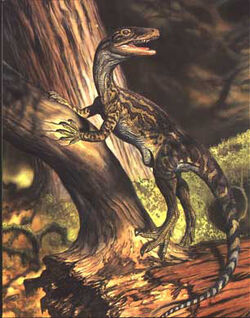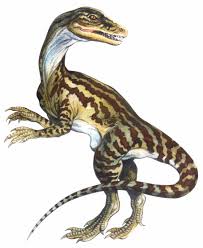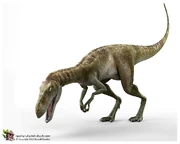| Staurikosaurus | |
|---|---|
 An artist's rendering of Staurikosaurus | |
| Height: | 80 cm |
| Length: | 2.2 meters |
| Mass: | 30 kg |
| Family: | †Herrerasauridae |
| Historical period: | Late Triassic |
| Habitat: | Brazil |
Staurikosaurus (store-EE-koh-SORE-us) (Southern Cross Lizard) was a small, Herrerasaurid theropod dinosaur that lived in Brazil during the Late Triassic Period (225 MYA).

Discovery[]
In 1936, a Brazilian paleontologist named Llewellyn Ivor Prince discovered a small, early species of theropod while digging in the baldands of the Santa Maria Formation in southern Brazil.

Staurikosaurus Skeleton
However, it wasn't until 1970 when a team of scientists revisited the site that this early species of dinosaur was rediscovered and officially named. It was named Staurikosaurus princei, meaning "Prince's Southern Cross Lizard", referring to the constellation "The Southern Cross", which can only be seen in the Southern Hemisphere, and Llewellyn Ivor Prince, than man who discovered this dinosaur. Based on it being an early theropod, living in the same area, and having similar construction to Herrerasaurus, in 1973 Benedetto dubbed Staurikosaurus to be in the genus Herrerasauridae, which also includes other small, early dinosaurs like Eoraptor.
Description[]
Staurikosaurus was 7 ft (2.25 meters) and 31 inches (80 centimeters) tall
Staurikosaurus shared many features with its much larger cousin, Herrerasaurus, such as a long, rather slender head with several sharp teeth and powerful jaws to tear through the meat that it ate.

Although it likely could see well, Staurikosaurus didn't have forward-facing eyes, so it wasn't capable of seeing its surroundings in-depth very well. Like most other early dinosaurs, it also had a relatively long, slender neck and body, which was designed to help it move streamlined fast and either catch up with the small, fast-moving animals it preyed on or stay ahead of larger, more dangerous predators like the menacing prestosuchus. It had long arms with gripping hands with five fingers and hook-like claws to grasp hold of small prey. Staurikosaurus' legs were also relatively long and had three toes with sharp talons at the end of each one. Its tail was also extended and would've helped balanced this sleek theropod while running and it had a long tail with more than 40 vertibrae.

Classification[]
Paleobiology[]
Paleoecology[]
In Popular Culture[]
- Staurikosaurus was shown in the Animal Planet documentary Animal Armageddon, where it showed how it was able to survive the Triassic Extinction and ultimately help the dinosaurs take over the world from the crocodilian-like thecodonts such as Desmatosuchus and Rutiodon.
- Staurikosaurus also appears as the starter dinosaur in Fossil League.

Animal Armageddon Staurikosaurus
- It makes an appearance in the game Dino Hunter: Deadly Shores.
Gallery[]
Staurikosaurus/Gallery
References[]
Sites:
http://www.wikidino.com/?page_id=1239
http://en.wikipedia.org/wiki/Staurikosaurus
http://animal.discovery.com/dinosaurs/staurikosaurus.htm
http://ageofdinosaurs.com/dinosaurs/staurikosaurus.htm
http://www.prehistoric-wildlife.com/species/s/staurikosaurus.html
Documentaries:
Animal Armageddon